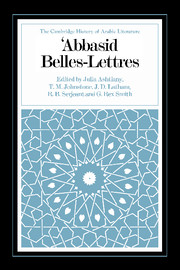Book contents
- Frontmatter
- The ʿAbbasid Caliphate: a historical introduction
- 1 Adab and the concept of belles-lettres
- 2 Shuʿūbiyyah in Arabic literature
- 3 Ibn al-Muqaffaʿ and early ʿAbbasid prose
- 4 Al-Jāḥiẓ
- 5 Al-Ṣaḥib Ibn ʿAbbād
- 6 Abū Ḥayyān al-Tawḥīdī
- 7 Al-Hamadhānī, al-Ḥarīrī and the maqāmāt genre
- 8 Fables and legends
- 9 ʿAbbasid poetry and its antecedents
- 10 Hunting poetry (ṭardiyjāt)
- 11 Political poetry
- 12 Love poetry (ghazal)
- 13 Wine poetry (khamriyyāt)
- 14 Mystical poetry
- 15 Ascetic poetry (zuhdiyyāt)
- 16 Bashshār b. Burd, Abū ʾl-ʿAtāhiyah and Abū Nuwās
- 17 Al-Mutanabbī
- 18 Abū Firās al-Ḥamdānī
- 19 Abū ʾl-ʿAlāʾ al-Maʿarrī
- 20 Literary criticism
- 21 Ibn al-Muʿtazz and Kitāb al-Badīʿ
- 22 Regional literature: Egypt
- 23 Regional literature: the Yemen
- Appendix: Table of metres
- Bibliography
- Index
20 - Literary criticism
Published online by Cambridge University Press: 28 May 2012
- Frontmatter
- The ʿAbbasid Caliphate: a historical introduction
- 1 Adab and the concept of belles-lettres
- 2 Shuʿūbiyyah in Arabic literature
- 3 Ibn al-Muqaffaʿ and early ʿAbbasid prose
- 4 Al-Jāḥiẓ
- 5 Al-Ṣaḥib Ibn ʿAbbād
- 6 Abū Ḥayyān al-Tawḥīdī
- 7 Al-Hamadhānī, al-Ḥarīrī and the maqāmāt genre
- 8 Fables and legends
- 9 ʿAbbasid poetry and its antecedents
- 10 Hunting poetry (ṭardiyjāt)
- 11 Political poetry
- 12 Love poetry (ghazal)
- 13 Wine poetry (khamriyyāt)
- 14 Mystical poetry
- 15 Ascetic poetry (zuhdiyyāt)
- 16 Bashshār b. Burd, Abū ʾl-ʿAtāhiyah and Abū Nuwās
- 17 Al-Mutanabbī
- 18 Abū Firās al-Ḥamdānī
- 19 Abū ʾl-ʿAlāʾ al-Maʿarrī
- 20 Literary criticism
- 21 Ibn al-Muʿtazz and Kitāb al-Badīʿ
- 22 Regional literature: Egypt
- 23 Regional literature: the Yemen
- Appendix: Table of metres
- Bibliography
- Index
Summary
BASIC ISSUES AND PRINCIPLES
Writing in 274/887, the ʿAbbasid poet and literary theorist Ibn al-Muʿtazz expressed the feeling that he was exploring a new territory of literary enquiry by identifying a new “poetics” which had emerged with the “modern” poets (muḥdathūri) of the second and third centuries of Islam. The term al-badīʿ by which he characterized this poetics had been used before by al-Jāḥiẓ in a brief reference attributing the actual coinage of the term to the transmitters (rāmīs) of poetry. The time gap between the first appearance of the term and its usage to designate a distinct trend in Arabic poetry might well span a whole century. Yet when Ibn al-Muʿtazz wrote, delimiting its boundaries and identifying its constituents, he did so with an obvious degree of tentativeness. His work, he said, represented a personal choice and allowed for the possibility of others defining the new poetics and identifying its elements in different ways. A few decades later, another critic of a very different temperament and education, Qudāmah b. Jaʿfar, wrote on poetry with an equal feeling of being a pioneer, asserting that, despite much work on various aspects of poetry, nobody had produced a book on its critical evaluation. Moreover, Qudāmah felt that his was a new territory unmapped by critics and thus lacking a specialized terminology which could furnish the necessary background for his discussion.
- Type
- Chapter
- Information
- Abbasid Belles Lettres , pp. 339 - 387Publisher: Cambridge University PressPrint publication year: 1990
- 2
- Cited by



